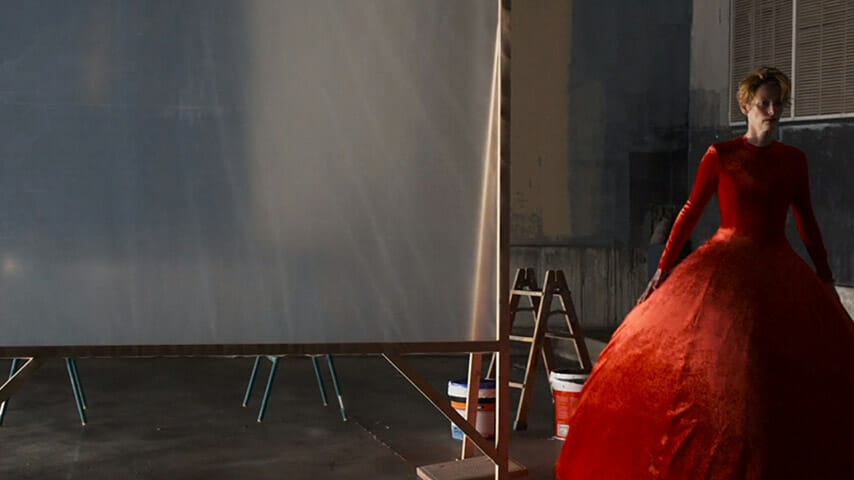Pedro Almodóvar Makes a Stunning English Language Debut in The Human Voice
NYFF58 Review

The English language is centered for the first time in Pedro Almodóvar’s career in The Human Voice, the Spanish filmmaker’s 30-minute short adapted from a monologue play originally written by prolific French poet and filmmaker Jean Cocteau. Tilda Swinton plays a woman whose lover has up and left her, which causes her to act in severely self-destructive (and ultimately self-serving) ways. The majority of the film consists of a phone call between the main character and her former lover, comically brought into the 21st century via bluetooth airpods. The audience only ever hears the protagonist’s side of the conversation.
Castilian Spanish, and to a smaller extent the city of Madrid, are still clearly present in the film. Store clerks, firemen and pedestrians all chat in Spanish, and Swinton’s character seems to know enough of the language to get by. The exact location is never revealed through architecture or street names, but a seal emblazoned on the side of a vehicle as Swinton walks down the street briefly cements the film’s location in the Spanish capital.
While The Human Voice minimizes the presence of the Spanish language and city, it still flaunts many of Almodóvar’s conventions, easily identifiable through its campy design, vibrant colors and focus on a lovelorn woman with a penchant for melodrama. Yet instead of acting as a short, satisfying jaunt through Almodóvar’s aesthetic, The Human Voice is an exercise in deconstructing the very tenets the filmmaker has propped himself on throughout the entirety of his career.
The colorful motif of construction tools and instruments in the title card—as well as the main character’s contemplative purchase of an axe from a hardware store—illustrate the filmmaker’s intent of not only creating something new, but meticulously disassembling the nature of his career. The main character’s swanky yet kitschy abode is only drywall and support beams constructed in the middle of a bleak, sprawling industrial warehouse—drenched in hues of grey and black antithetical to Almodóvar’s iconic color schemes—almost presented as a film set in a studio. Swinton’s character is also an actress, but little is revealed about the circumstances of her relationship, her living situation or her broader life’s story. This character’s entire world is this now defunct relationship, the lack of closure from which drives her to an irrational but ultimately satisfying act of destruction. It is in this destruction that the protagonist gains her confidence and independent spirit back, which is perhaps what Almodóvar aims to achieve with this exercise. Through identifying and demolishing what defines us comes the possibility to truly create something new.